Living Factories Will Introduce Synthetic Biology Education to Finland
Synthetic biology is making a name for itself all over the world and is now coming to Finland as well. The Living Factories project, a joint endeavour of VTT, University of Turku and Åbo Akademi University, is the forerunner in the field in Finland and it received nearly 4 million euro funding from Tekes.

According to Professor Eva-Mari Aro, the strategic research openings funding from Tekes makes it possible to introduce a completely new field of research to Finland. – Our goal is to bring the technology to Finland and involve the industry in the field, says Aro.
Tekes has granted funding for three strategic research openings. Living Factories received 3,955,000 euro for the first research half which is two and a half years.
In Turku, the project is led by Academy Professor Eva-Mari Aro. She believes that the Tekes funding will open up new possibilities both in research and education.
– Synthetic biology is a new and rising research field worldwide. Our goal is to organise education in the discipline in Turku and at Aalto University. The basis for the project is the previous consortium in synthetic biology, which was part of the Academy of Finland’s SynBio programme and comprised of the University of Turku, Aalto University and VTT Technical Research Centre of Finland. A new discipline offering research and education could not be otherwise established this fast, says Aro.
One of the partners is the leading university in field – Berkeley University of California.
In Turku, the introduction of synthetic biology will show in the current education in that the international Master’s Degree Programme in Molecular Systems Biology at the Department of Biochemistry will be changed into the Master’s degree programme in molecular systems and synthetic biology.
Synthetic Biology Creates Systems that Do Not Exist in Nature
The project aims to develop and utilise the full potential of synthetic biology in Finland. The research field, which is also called a breakthrough technology of the future, is believed to have a great impact on our future.
– Synthetic biology is based on the design and engineering of new-to-nature biological systems. It has great potential to generate novel industrial processes and products, describes the presentation of the project which is coordinated by Research Professor Merja Penttilä from VTT.
The Living Factories is planning to create a new academia-industry-education environment which will be highly competitive internationally and utilises the unique functionalities that the combination of biology and engineering sciences can offer. It is a chance to develop novel and visionary solutions for a sustainable biobased society.
– In the next 2.5 years, we have to prove the significance and strength of synthetic biology and at the same time involve the industry in the field, says Aro.
Photosynthesis Expertise Is Turku’s Strength
The primary goal of the project is to develop the processes which conserve energy and reduce carbon emissions. It is the responsibility of the researchers from Turku to utilise photosynthesis mechanisms in the Living Factories project.
– Our areas of expertise are
photosynthesis and cyanobacteria. VTT and Aalto University have carried out their research in bioproduction mainly with yeast and bacteria that do not photosynthesise, says Aro.
– In the Living Factories project, we choose the best pieces, for example the most efficient metabolism reactions and processes of converting light energy, from different organisms and conjoin them into new combinations. In addition, we will remodel single enzymes to produce important new compounds for the bioindustry.
At Turku, the project will fund the work of one post doc researcher and one doctoral candidate. In addition to the funding, Aro emphasises the close collaboration of the universities and VTT as well as the strengths and advantages it brings to the project.
Text: Erja Hyytiäinen
Photo: Hanna Oksanen
Translation: Mari Ratia